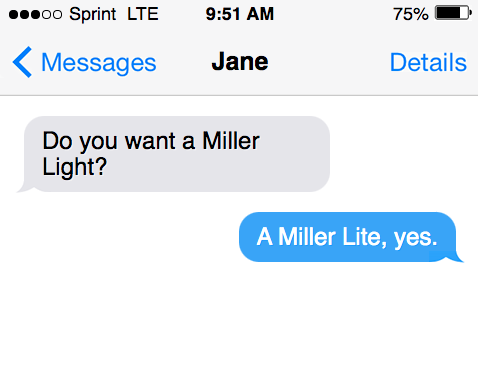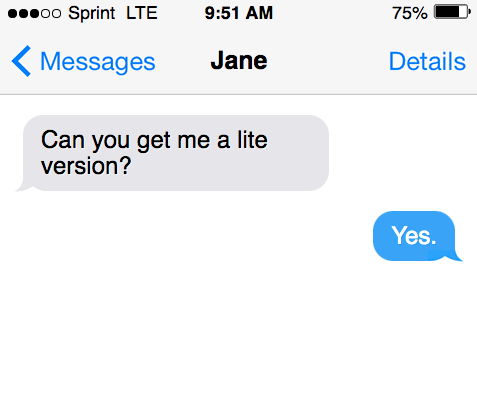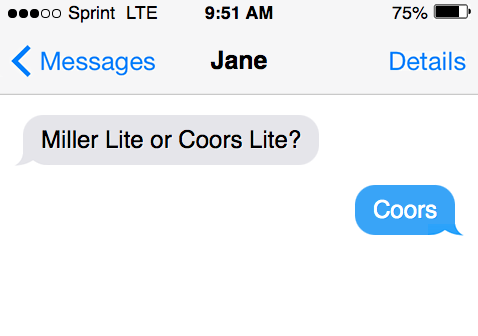Lite vs. light, which is correct? “Lite” is frequently used in the United States. For example, someone could purchase a Miller Lite product. Although, it is not referred to as a Miller Light, which could be grammatically correct. Why is this?
Learn the difference between lite and light in this short guide…
What is the meaning of “light”
According to Merriam-Webster, the word “light” means “to become light.” Or “the natural agent that stimulates sight and makes things visible” in the noun form.
Typically, the question is the adjective version of the word. Which means “of little weight; not heavy.” Or “not strongly or heavily built or constructed.”
Most commonly, when thinking about using “light” or “lite,” someone is requesting the adjective form of this word. For example, “I lifted the package from the ground. I was surprised to find out that it was light and didn’t weigh much.”

Examples of “light” used as an adjective
The adjective form is the most common writing style. Here are examples of “light” getting used in common sentences:
“I installed the light version of the software.”
“I picked up the briefcase to find out that it was surprisingly light.”
Examples of “light” used as a noun
A noun form of the word “light” typically refers to something that is getting illuminated—for example, turning on a lamp. That would “light” the room. It refers to luminescence, luminosity, and shining brightness.
Examples sentences would be the following:
- “The sunlight hit her face, and I could see it light her smile up.”
- “The light of the sun was blinding. We needed to put on sunglasses.”
What is the plural noun of light?
“Lights” is the plural noun of the form “light.” For example, “I hung Christmas lights today while it was warm outside.”
It’s important to understand the plural form of “light” to understand that the word “lites” should never get used.
What does “lite” mean?
“Light” and “lite” carry the same meaning. The word “lite” is a commercial term for the word “light.” For example, “I wanted the lite version of the software” is a sentence that could get used in advertising.
Commercializing these terms is a way of standing out in a respective industry. For example, “lite news,” “film noir lite,” or “lite beer” are all ways that products can get commercialized by brands to stand out.
A “lite beer” is simply a low-fat version of the original product. This is where the original reference to the word “light” has the same meaning. Is it an actual lighter version of the product. Or a simpler than the normal version of the original product.

Examples of “lite” in commercial terms
- Lite soda
- Lite beer
Why is “lite” a commercialized word?
The different spellings help the brand to distinguish itself from competitors. For example, every beer company has a “light” or low sugar/less alcohol version of their product. The informal variant “lite” helps the brand to separate themselves from its respective counterparts.
Something that is “lite” in contemporary English can be:
- Less weight
- Lower calorie/low calorie
- Fewer calories
Most commonly, it refers to beverages, food products, and software.
Examples of “lite” in common sentences
Here are examples where “lite” can get used in a sentence as an informal word:
- “I went to the Chicago Cubs game where I ordered a Miller Lite.”
- “I wanted to buy the cheaper version of the software. I decided to get the lite version that cost only $99 per month.”
- “We decided to go to the concession stand to order a few more cocktails. I got the lite version of the beer.”
Differences between “light” and “lite”
What’s the difference between these two words? Nothing. In their adjective form, they both mean the same thing. A lighter or less complex form of the original thing. For example, “lite” could mean fewer features or fewer calories. It is the same as “light.”
When referring to “light” in the noun form, “lite” and “light” hold significant differences.
For example, “The red light turned quickly, and I had to steer away.” In this sentence, the word “light” is the noun form. Referring to something getting illuminated. The informal version “light” does not make sense.
Remember, “light” in the noun form refers to “makes vision, enables vision, illuminates.”

Which is correct, “light” or “lite?”
The correct word is “light.” In formal writing, never use the word “lite.” Unless referring to a product that is “fatless” or “low-calorie.” For example, “Coors Lite.”
For marketing-related contexts, “lite” became a fun word to use. It had fewer letters, making it unique. And it became an informal variant of the word “light.” The word “light” can hold several meanings depending on its form (adjective, verb, or noun). While “lite” typically has one meaning and spelling. To refer to something as “less heavy, less alcohol, or lower in sugar.”
Common questions
Questions from those curious about the English language.
Is “lite” an actual word?
Yes and no. It is not a grammatically correct word. It has become an informal version of the word “light.” Relating to being “less complex” or “containing less ingredients.” It should never get used instead of “light” in formal writing.
What is another word for “Lite?”
Here are other words for “lite”:
- Fatless
- Low-calorie
- Nonfat
- Calorie-free
- Low-cal
- Low-sugar
- Fat-free
Sources
- Light Definition & Meaning – Merriam-Webster
- Lite Definition & Meaning – Dictionary.com
- Lite or Light? Which Spelling Is Right? – APA Style 6th Edition Blog
- Lite Definition & Meaning – Merriam-Webster
- What does lite mean? | Best 18 Definitions of Lite – YourDictionary
Inside this article
Fact checked:
Content is rigorously reviewed by a team of qualified and experienced fact checkers. Fact checkers review articles for factual accuracy, relevance, and timeliness. Learn more.
Core lessons
Glossary
- Abstract Noun
- Accusative Case
- Anecdote
- Antonym
- Active Sentence
- Adverb
- Adjective
- Allegory
- Alliteration
- Adjective Clause
- Adjective Phrase
- Ampersand
- Anastrophe
- Adverbial Clause
- Appositive Phrase
- Clause
- Compound Adjective
- Complex Sentence
- Compound Words
- Compound Predicate
- Common Noun
- Comparative Adjective
- Comparative and Superlative
- Compound Noun
- Compound Subject
- Compound Sentence
- Copular Verb
- Collective Noun
- Colloquialism
- Conciseness
- Consonance
- Conditional
- Concrete Noun
- Conjunction
- Conjugation
- Conditional Sentence
- Comma Splice
- Correlative Conjunction
- Coordinating Conjunction
- Coordinate Adjective
- Cumulative Adjective
- Dative Case
- Determiner
- Declarative Sentence
- Declarative Statement
- Direct Object Pronoun
- Direct Object
- Diction
- Diphthong
- Dangling Modifier
- Demonstrative Pronoun
- Demonstrative Adjective
- Direct Characterization
- Definite Article
- Doublespeak
- False Dilemma Fallacy
- Future Perfect Progressive
- Future Simple
- Future Perfect Continuous
- Future Perfect
- First Conditional
- Irregular Adjective
- Irregular Verb
- Imperative Sentence
- Indefinite Article
- Intransitive Verb
- Introductory Phrase
- Indefinite Pronoun
- Indirect Characterization
- Interrogative Sentence
- Intensive Pronoun
- Inanimate Object
- Indefinite Tense
- Infinitive Phrase
- Interjection
- Intensifier
- Infinitive
- Indicative Mood
- Participle
- Parallelism
- Prepositional Phrase
- Past Simple Tense
- Past Continuous Tense
- Past Perfect Tense
- Past Progressive Tense
- Present Simple Tense
- Present Perfect Tense
- Personal Pronoun
- Personification
- Persuasive Writing
- Parallel Structure
- Phrasal Verb
- Predicate Adjective
- Predicate Nominative
- Phonetic Language
- Plural Noun
- Punctuation
- Punctuation Marks
- Preposition
- Preposition of Place
- Parts of Speech
- Possessive Adjective
- Possessive Determiner
- Possessive Case
- Possessive Noun
- Proper Adjective
- Proper Noun
- Present Participle
- Prefix
- Predicate



